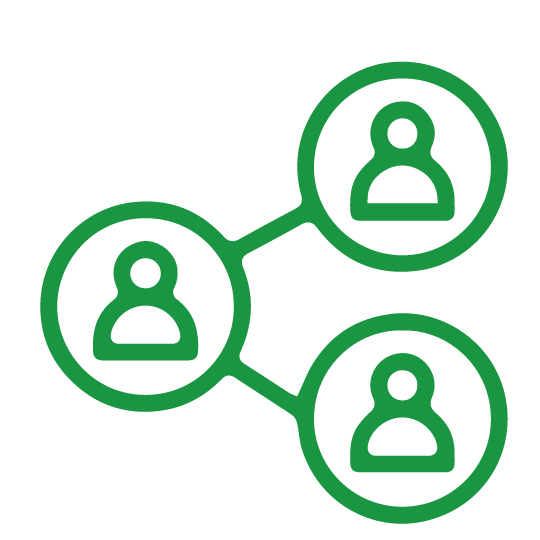Informing a hundred or so employees of a Dutch ministry about a process without merely transmitting in the process. That was the client's challenge. Besides informing employees about the connection between activities and responsibilities, the aim was to activate them to start working with the process themselves. After all, what use is knowledge to an employee that cannot be applied? Given the current situation, physical meetings have not been possible for some time. For this reason, a creative and activating way to meet this challenge was sought.
The solution: the online simulation game
Through an online simulation game led by Willem-Jan Vos, Jacco van de Griek and Bibi Looijestijn of Improven, employees in groups of up to 20 participants were enabled to go through the so-called production process with each other. A characteristic of a production process is that it has a cross-departmental character. The group composition took this into account by reflecting all departments and teams involved in the process. The simulation consisted of two parts. On the one hand, using a process game, employees were 'trained' in the different phases of the production process. On the other hand, a chain game was used to 'test' whether what had been lived through with each other had been internalised.
By making the simulation fun, simple and interactive, employees were activated to engage with the production process.
Simulating: training, testing and listening
Using a process game, participants were trained by going through a process flow online with each other in which key moments, key actors and phases (interpretation and purpose) had been omitted. Practical case studies were also handled. It was up to the participants to fill these with each other using digital post-it notes. The process flow involved a simple visual representation of the production process and served as a tool to facilitate dialogue between participants and to see the 'big picture'. The outcome of the process game was that very valuable dialogues emerged between different disciplines in relation to the course of the process, everyone's role and corresponding responsibilities.
Testing took place through a chain game in which participants were asked 20 multiple-choice questions online. Questions that were answered differently by participants were discussed in plenary.
Both during training and testing, participants were listened to by keeping a logbook that was handed over to the client after the simulation, thus enabling them to evaluate the established process and make improvements.
The tools: Miro, Mentimeter and Webex
To support the simulation, the tools Miro, Mentimeter and Webex were used. Miro is a popular interactive platform and was used to place the process flow as an image on a whiteboard to facilitate dialogue and show the 'big picture'. Mentimeter, a polling and presentation tool, was used to present multiple-choice questions to participants during the chain game. Participants could answer via phone and, based on ranking, an 'expert' was determined. Webex, an online web and video conferencing tool was used during the simulation to communicate with each other and share screens.
The tools: work and trainer's manual
Participants received a workbook prior to the simulation. This workbook explained what the simulation consisted of such as learning objectives, an explanation of the various tools, case studies and also what a participant could do in preparation. In addition, a trainer's handbook was made available that explained, among other things, the set-up, schedule and script, should the client wish to facilitate such simulations itself in the future.
Customer demand
The trigger for the simulation was that the client's ambition is to operate as a 'smart network player'. This requires the organisation to be a reliable and predictable partner, both internally and externally. In this respect, it is very important that employees know what the organisation does and what that means for everyone in terms of expectations. This required actively and intensively living through the production process in which the consultancy firm IMPROVEN was asked to guide this transition which resulted in a very satisfied client. Incidentally, the client request and resulting assignment was obtained through Verdonck, Klooster & Associates. A consultancy firm with which IMPROVEN has a pleasant partnership.
IMPROVEN
IMPROVEN works with you to improve your organisation's performance, processes and projects. Our promise "it can always be better" is in our DNA. We do this based on proven approaches, which we tailor to your specific (change) issues. IMPROVEN's strength is actually implementing the solution based on a shared vision of your challenge and ambition... Who are we? The experienced thinking doers, passionate and creative subject specialists who do not leave until it works and is secured.
Are you interested or do you have questions about our services such as the above showcase? Then contact us and we will be happy to tell you about our approach and possibilities.























